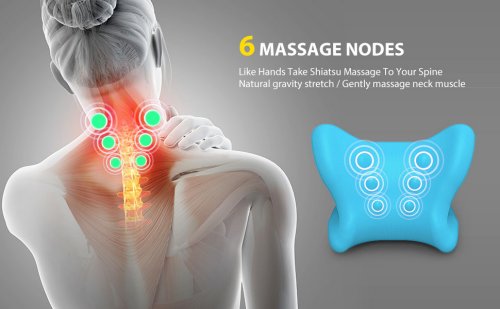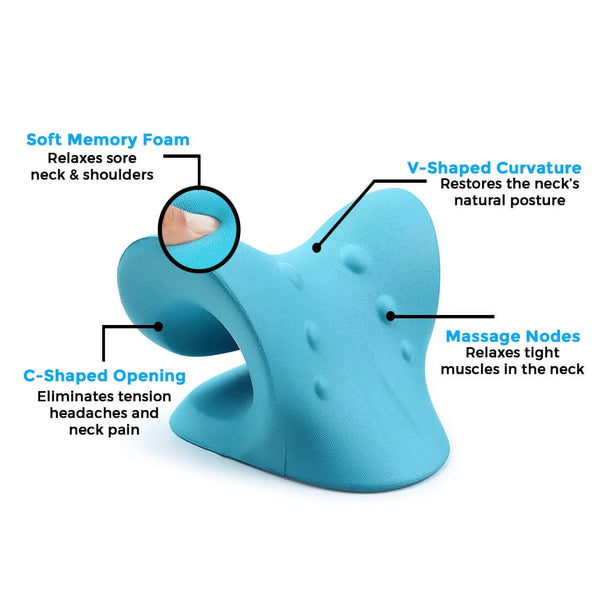Neck Cloud: Ingenious Assistance for Discomfort Alleviation and Better Stance
Neck Cloud: Ingenious Assistance for Discomfort Alleviation and Better Stance
Blog Article
The Effect of Stress And Anxiety on Neck Pain: Strategies for Lowering Stress and Pain
In today's hectic globe, it's no trick that stress has come to be a widespread variable in the beginning and worsening of neck pain. The elaborate connection in between anxiety and muscular tissue tension often leaves people seeking remedy for the discomfort that occurs. By discovering targeted methods targeted at minimizing tension and advertising relaxation, one can begin to attend to the source of neck pain and job in the direction of an extra well balanced state of health. Join us on a trip to decipher the effect of stress and anxiety on neck discomfort and find efficient means to ease pain and improve general high quality of life.
Understanding Stress-Related Neck Discomfort
Neck discomfort is a common issue that can often be associated to stress. Stress-related neck pain can show up as stress, rigidity, or discomfort in the neck and shoulder location. The link in between stress and anxiety and neck discomfort depends on the body's physical reaction to tension, which can lead to muscle mass stress and rigidity in the neck muscle mass. Chronic tension can bring about consistent neck discomfort and intensify existing conditions like cervical spondylosis or muscle strains.

Identifying Common Tension Areas
Often experienced by people under tension, tension areas in the body can offer useful insights right into the physical manifestations of emotional strain. One typical tension area is the neck, where anxiety typically manifests physically. Tension headaches, stiff neck muscular tissues, and restricted variety of activity are typical signs of stress-related neck tension. The shoulders are an additional typical location where tension gathers. Tension can cause the muscular tissues in the shoulders to tighten, resulting in pain and pain. In addition, the upper back is susceptible to tension build-up, especially in individuals that experience chronic anxiety. Poor stance and extended sitting can aggravate stress in this field. The jaw is also a common place for stress-related tension, as several individuals squeeze their jaw or grind their teeth when stressed. Knowing these usual stress locations can help people identify the physical indications of tension and take actions to address them before they rise right into persistent pain or discomfort.
Implementing Leisure Techniques
To effectively handle stress-related stress in the body, applying leisure techniques is vital. Leisure strategies are beneficial devices for decreasing neck pain created by stress and anxiety. Deep breathing exercises can aid soothe the mind and kick back tense muscular tissues in the neck and shoulders (neck cloud). Practicing mindfulness meditation can likewise be valuable in reducing stress and anxiety and promoting leisure. Dynamic muscle mass relaxation, where you systematically stressful and then kick back various muscle mass teams, can launch built-up stress in the neck location. In addition, tasks like yoga exercise and tai chi include both physical motion and leisure, making them efficient methods for decreasing anxiety and neck discomfort. Taking regular breaks throughout the day to stretch and unwind can stop muscular tissue tightness and tension from collecting. By including these relaxation strategies into your day-to-day routine, you can assist take care of tension levels, decrease tension in the neck, and reduce discomfort connected with stress-induced neck pain.
Incorporating Self-Care Practices
Including self-care practices is essential for maintaining total well-being and managing stress-related neck pain effectively. Engaging in regular physical activity, such as mild extending workouts or yoga exercise, can assist alleviate tension in the neck and shoulders. Practicing site link excellent pose throughout the day and taking frequent breaks from extended resting or screen time can likewise stop strain on the neck muscular tissues.
Furthermore, prioritizing appropriate rest and developing a regular sleep routine can contribute dramatically this link to decreasing tension levels and promoting relaxation. Creating a calming bedtime regimen, such as reviewing a book or taking a warm bath, can help prepare the body and mind for relaxed rest. Additionally, keeping a well balanced diet plan abundant in nutrients and remaining moistened can sustain total wellness and decrease swelling that might intensify neck pain.
Incorporating mindfulness practices, such as deep breathing workouts or reflection, can aid take care of tension and promote leisure. Taking time for oneself, involving in hobbies, and setting limits to shield individual time are likewise essential elements of self-care that can add to decreasing tension and minimizing neck discomfort.
Looking For Specialist Help
Exactly how can individuals properly address consistent neck discomfort that is affecting their life and well-being? Looking for expert help can be an essential action in handling and reducing neck discomfort. Consulting with healthcare professionals such as chiropractors, physical therapists, or orthopedic specialists can give valuable insights and personalized therapy plans. These experts can carry out comprehensive assessments to detect the underlying root causes of neck pain and recommend ideal treatments.
Chiropractic specialists concentrate on spine manipulation strategies to boost alignment and decrease tension in the neck area. Physical therapists offer targeted exercises and stretches to strengthen muscle mass, enhance adaptability, and boost overall neck feature. Orthopedic specialists can offer sophisticated clinical interventions such as injections or surgical options for extreme cases of neck pain.
Conclusion

Stress-related neck pain can materialize as tension, rigidity, or discomfort in the neck and shoulder area. The connection between tension and neck pain exists in the body's physical feedback to stress, which can result in muscle mass tension and tightness in the neck muscles. Tension frustrations, tight neck muscles, and restricted range of activity are common signs of stress-related neck stress. By including these relaxation methods into your daily regimen, you can aid handle anxiety levels, reduce stress in the neck, and relieve discomfort connected with stress-induced neck discomfort.

Report this page